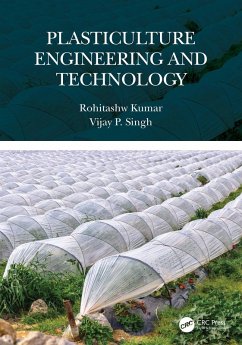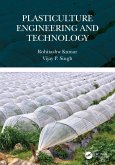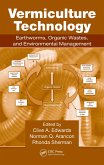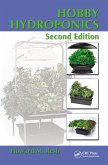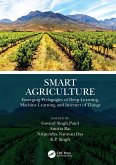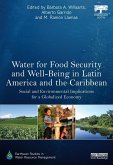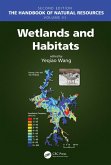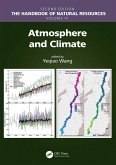48,95 €
48,95 €
inkl. MwSt.
Sofort per Download lieferbar

24 °P sammeln
48,95 €
Als Download kaufen

48,95 €
inkl. MwSt.
Sofort per Download lieferbar

24 °P sammeln
Jetzt verschenken
Alle Infos zum eBook verschenken
48,95 €
inkl. MwSt.
Sofort per Download lieferbar
Alle Infos zum eBook verschenken

24 °P sammeln
- Format: PDF
- Merkliste
- Auf die Merkliste
- Bewerten Bewerten
- Teilen
- Produkt teilen
- Produkterinnerung
- Produkterinnerung

Bitte loggen Sie sich zunächst in Ihr Kundenkonto ein oder registrieren Sie sich bei
bücher.de, um das eBook-Abo tolino select nutzen zu können.
Hier können Sie sich einloggen
Hier können Sie sich einloggen
Sie sind bereits eingeloggt. Klicken Sie auf 2. tolino select Abo, um fortzufahren.

Bitte loggen Sie sich zunächst in Ihr Kundenkonto ein oder registrieren Sie sich bei bücher.de, um das eBook-Abo tolino select nutzen zu können.
This book discusses the myriad important aspects of crop production that utilize plastic, such as micro irrigation, water management, plastic mulch films, protected cultivation and low tunnels, crop covers, canal linings, silage bags, and more.
- Geräte: PC
- ohne Kopierschutz
- eBook Hilfe
- Größe: 85.09MB
Andere Kunden interessierten sich auch für
![Plasticulture Engineering and Technology (eBook, ePUB) Plasticulture Engineering and Technology (eBook, ePUB)]() Rohitashw KumarPlasticulture Engineering and Technology (eBook, ePUB)48,95 €
Rohitashw KumarPlasticulture Engineering and Technology (eBook, ePUB)48,95 €![Vermiculture Technology (eBook, PDF) Vermiculture Technology (eBook, PDF)]() Vermiculture Technology (eBook, PDF)48,95 €
Vermiculture Technology (eBook, PDF)48,95 €![Hobby Hydroponics (eBook, PDF) Hobby Hydroponics (eBook, PDF)]() Howard M. ReshHobby Hydroponics (eBook, PDF)34,95 €
Howard M. ReshHobby Hydroponics (eBook, PDF)34,95 €![Smart Agriculture (eBook, PDF) Smart Agriculture (eBook, PDF)]() Smart Agriculture (eBook, PDF)48,95 €
Smart Agriculture (eBook, PDF)48,95 €![Water for Food Security and Well-being in Latin America and the Caribbean (eBook, PDF) Water for Food Security and Well-being in Latin America and the Caribbean (eBook, PDF)]() Water for Food Security and Well-being in Latin America and the Caribbean (eBook, PDF)46,95 €
Water for Food Security and Well-being in Latin America and the Caribbean (eBook, PDF)46,95 €![Wetlands and Habitats (eBook, PDF) Wetlands and Habitats (eBook, PDF)]() Wetlands and Habitats (eBook, PDF)46,95 €
Wetlands and Habitats (eBook, PDF)46,95 €![Atmosphere and Climate (eBook, PDF) Atmosphere and Climate (eBook, PDF)]() Atmosphere and Climate (eBook, PDF)46,95 €
Atmosphere and Climate (eBook, PDF)46,95 €-
-
-
This book discusses the myriad important aspects of crop production that utilize plastic, such as micro irrigation, water management, plastic mulch films, protected cultivation and low tunnels, crop covers, canal linings, silage bags, and more.
Dieser Download kann aus rechtlichen Gründen nur mit Rechnungsadresse in A, B, BG, CY, CZ, D, DK, EW, E, FIN, F, GR, HR, H, IRL, I, LT, L, LR, M, NL, PL, P, R, S, SLO, SK ausgeliefert werden.
Produktdetails
- Produktdetails
- Verlag: Taylor & Francis eBooks
- Seitenzahl: 438
- Erscheinungstermin: 5. Mai 2022
- Englisch
- ISBN-13: 9781000555929
- Artikelnr.: 63970989
- Verlag: Taylor & Francis eBooks
- Seitenzahl: 438
- Erscheinungstermin: 5. Mai 2022
- Englisch
- ISBN-13: 9781000555929
- Artikelnr.: 63970989
- Herstellerkennzeichnung Die Herstellerinformationen sind derzeit nicht verfügbar.
Dr. Rohitashw Kumar (B.E., M.E., Ph. D.) is Associate Dean and Professor in College of Agricultural Engineering and Technology, Sher-e-Kashmir University of Agricultural Sciences and Technology of Kashmir, Srinagar, India.He is also Professor Water Chair (Sheikkul Alam ShiekhNuruddin Water Chair), Ministry of Jal Shakti, Government of India, at the National Institute of Technology, Srinagar (J&K). He is also Professor and Head, Division of Irrigation and Drainage Engineering. He obtained his Ph.D. degree in Water Resources Engineering from NIT, Hamirpur, and Master of Engineering Degree in Irrigation Water Management Engineering from MPUAT, Udaipur. He got leadership award in 2020, Special Research award in2017 and Student Incentive Award-2015 (Ph.D. Research) from the Soil Conservation Society of India, New Delhi. He also got the first prize in India for best M. Tech thesis in Agricultural Engineering in 2001. He has published over 100 papers in peer-reviewed journals, more than 25 popular articles,4 books,2 practical manuals, and 25bookchapters. He has guided one Ph.D student and 14 M.Tech in soil and water engineering. He has handled more than 12 research projects as a principal or co-principal investigator. Since 2011, he has been Principal Investigator of ICAR- All India Coordinated Research Project on Plastic Engineering in Agriculture Structural and Environment Management.
Prof. Vijay P. Singh is a Distinguished Professor, a Regents Professor, and the inaugural holder of the Caroline and William N. Lehrer Distinguished Chair in Water Engineering at the Texas A&M University. His research interests include surface-water hydrology, groundwater hydrology, hydraulics, irrigation engineering, environmental quality, water resources, water-food-energy nexus, climate change impacts, entropy theory, copula theory, and mathematical modeling. He graduated with a B.Sc. in Engineering and Technology with emphasis on Soil and Water Conservation Engineering in 1967 from the U.P. Agricultural University, India. He earned an MS in Engineering with specialization in Hydrology in 1970 from the University of Guelph, Canada; a Ph.D. in Civil Engineering with specialization in Hydrology and Water Resources in 1974fromthe Colorado State University, Fort Collins, USA, and a D.Sc. in Environmental and Water Resources Engineering in 1998 from the University of the Witwatersrand, Johannesburg, South Africa. He has published extensively on a wide range of topics. His publications include more than 1365 journal articles, 32 books, 80 edited books, 305 book chapters, and 315 conference proceedings papers. For his seminar contributions he has received more than 100 national and international awards, including three honorary doctorates. Currently he serves as Past President of the American Academy of Water Resources Engineers, the American Society of Civil Engineers (ASCE), and previously he served as President of the American Institute of Hydrology and Cahir, Watershed Council, ASCE. He is Editor-in-Chief of two book series, three journals, and serves on the editorial boards of more than 25 journals. He has served as Editor-in-Chief of three other journals. He is a Distinguished Member of the American Society of Civil Engineers, an Honorary Member of the American Water Resources Association, an Honorary Member of International Water Resource Association, and a Distinguished Fellow of the Association of Global Groundwater Scientists. He is a fellow of five professional societies. He is also a fellow or member of 11 national or international engineering or science academies.
Prof. Vijay P. Singh is a Distinguished Professor, a Regents Professor, and the inaugural holder of the Caroline and William N. Lehrer Distinguished Chair in Water Engineering at the Texas A&M University. His research interests include surface-water hydrology, groundwater hydrology, hydraulics, irrigation engineering, environmental quality, water resources, water-food-energy nexus, climate change impacts, entropy theory, copula theory, and mathematical modeling. He graduated with a B.Sc. in Engineering and Technology with emphasis on Soil and Water Conservation Engineering in 1967 from the U.P. Agricultural University, India. He earned an MS in Engineering with specialization in Hydrology in 1970 from the University of Guelph, Canada; a Ph.D. in Civil Engineering with specialization in Hydrology and Water Resources in 1974fromthe Colorado State University, Fort Collins, USA, and a D.Sc. in Environmental and Water Resources Engineering in 1998 from the University of the Witwatersrand, Johannesburg, South Africa. He has published extensively on a wide range of topics. His publications include more than 1365 journal articles, 32 books, 80 edited books, 305 book chapters, and 315 conference proceedings papers. For his seminar contributions he has received more than 100 national and international awards, including three honorary doctorates. Currently he serves as Past President of the American Academy of Water Resources Engineers, the American Society of Civil Engineers (ASCE), and previously he served as President of the American Institute of Hydrology and Cahir, Watershed Council, ASCE. He is Editor-in-Chief of two book series, three journals, and serves on the editorial boards of more than 25 journals. He has served as Editor-in-Chief of three other journals. He is a Distinguished Member of the American Society of Civil Engineers, an Honorary Member of the American Water Resources Association, an Honorary Member of International Water Resource Association, and a Distinguished Fellow of the Association of Global Groundwater Scientists. He is a fellow of five professional societies. He is also a fellow or member of 11 national or international engineering or science academies.
Chapter 1. Introduction. Chapter 2. Plastic Film Properties. Chapter 3.
Micro-Irrigation. Chapter 4. Design and Components of Micro Irrigation.
Chapter 5. Application of Plastic for Water Management. Chapter 6. Soil
Conditioning and Solarization Using Plastics. Chapter 7. Irrigation
Scheduling to Enhance Water Use Efficiency. Chapter 8. Plastics for Crop
Protection. Chapter 9. Plastics in Drying and Storage. Chapter 10. Plastics
in Aquaculture. Chapter 11. Plastics in Animal Husbandry. Chapter 12.
Plastics as Cladding Material. Chapter 13. Plastics in Postharvest
Management. Chapter 14. Plastics in Horticulture. Chapter 15. Plastic
Mulching. Chapter 16. Hydroponics and Vertical Farming. Chapter 17. Design
of Protected Structures. Chapter 18. Application of Plastic in Farm
Machinery. Chapter 19. Smart Farming Using Internet of Things (IoT). Sample
Question papers.
Micro-Irrigation. Chapter 4. Design and Components of Micro Irrigation.
Chapter 5. Application of Plastic for Water Management. Chapter 6. Soil
Conditioning and Solarization Using Plastics. Chapter 7. Irrigation
Scheduling to Enhance Water Use Efficiency. Chapter 8. Plastics for Crop
Protection. Chapter 9. Plastics in Drying and Storage. Chapter 10. Plastics
in Aquaculture. Chapter 11. Plastics in Animal Husbandry. Chapter 12.
Plastics as Cladding Material. Chapter 13. Plastics in Postharvest
Management. Chapter 14. Plastics in Horticulture. Chapter 15. Plastic
Mulching. Chapter 16. Hydroponics and Vertical Farming. Chapter 17. Design
of Protected Structures. Chapter 18. Application of Plastic in Farm
Machinery. Chapter 19. Smart Farming Using Internet of Things (IoT). Sample
Question papers.
Chapter 1. Introduction. Chapter 2. Plastic Film Properties. Chapter 3.
Micro-Irrigation. Chapter 4. Design and Components of Micro Irrigation.
Chapter 5. Application of Plastic for Water Management. Chapter 6. Soil
Conditioning and Solarization Using Plastics. Chapter 7. Irrigation
Scheduling to Enhance Water Use Efficiency. Chapter 8. Plastics for Crop
Protection. Chapter 9. Plastics in Drying and Storage. Chapter 10. Plastics
in Aquaculture. Chapter 11. Plastics in Animal Husbandry. Chapter 12.
Plastics as Cladding Material. Chapter 13. Plastics in Postharvest
Management. Chapter 14. Plastics in Horticulture. Chapter 15. Plastic
Mulching. Chapter 16. Hydroponics and Vertical Farming. Chapter 17. Design
of Protected Structures. Chapter 18. Application of Plastic in Farm
Machinery. Chapter 19. Smart Farming Using Internet of Things (IoT). Sample
Question papers.
Micro-Irrigation. Chapter 4. Design and Components of Micro Irrigation.
Chapter 5. Application of Plastic for Water Management. Chapter 6. Soil
Conditioning and Solarization Using Plastics. Chapter 7. Irrigation
Scheduling to Enhance Water Use Efficiency. Chapter 8. Plastics for Crop
Protection. Chapter 9. Plastics in Drying and Storage. Chapter 10. Plastics
in Aquaculture. Chapter 11. Plastics in Animal Husbandry. Chapter 12.
Plastics as Cladding Material. Chapter 13. Plastics in Postharvest
Management. Chapter 14. Plastics in Horticulture. Chapter 15. Plastic
Mulching. Chapter 16. Hydroponics and Vertical Farming. Chapter 17. Design
of Protected Structures. Chapter 18. Application of Plastic in Farm
Machinery. Chapter 19. Smart Farming Using Internet of Things (IoT). Sample
Question papers.
